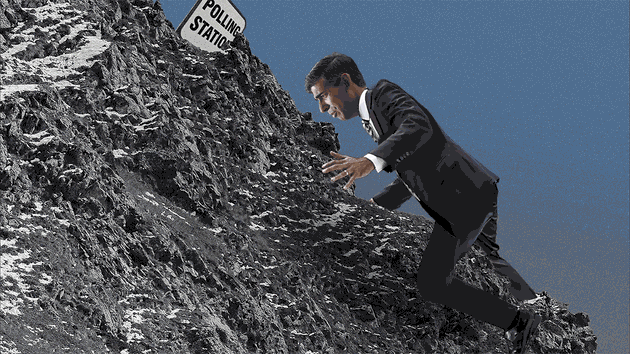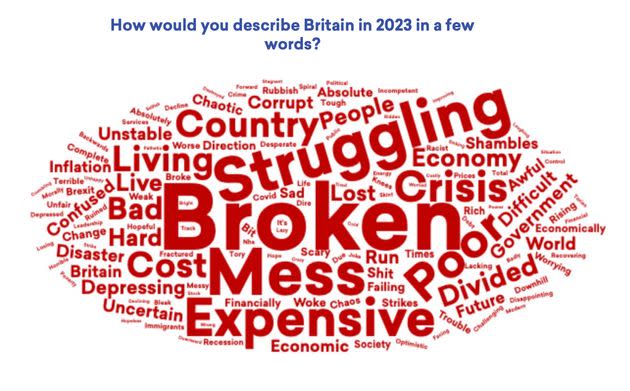As The General Election Approaches, Rishi Sunak Has A Mountain To Climb

Rishi Sunak has a mountain to climb to stay prime minister.
It might not seem like it to the outside world, but as far as Westminster is concerned, the general election campaign has already begun.
Labour leader Keir Starmer now has the team in place which will take his party to polling day, while Rishi Sunak will put the finishing touches to his own frontbench line-up later in the year.
Speak to any MP and it isn’t long before the conversation turns to when they think the prime minister will go to the country (May next year is gaining in popularity) and what, if any, chance the Tories have of another term in office.
The bad news for Sunak is that all the available evidence suggests he is heading for defeat regardless of when the election takes place.
New polling by the More in Common think tank this week demonstrated the scale of the Everest-like challenge the PM is facing.
A staggering three-quarters of all voters - including nearly half of those who backed the Conservatives in 2019 - say they want a change of government.
Luke Tryl, More in Common’s UK director, said: “Those figures are really, really stark. I was quite surprised when I saw them.
“Lots of people don’t think the last 13 years of Conservative government have been good for the country.
“We know that when there is a ‘time for change’ mood in the electorate, it is very hard to push against that.”
He added: “People think the country doesn’t work, it’s too expensive and they’re exhausted, which is quite a hopeless context for an election that’s difficult for both parties, but more so for the government.”
Perhaps just as worryingly for No.10, the sheen appears to have well and truly worn off Sunak himself as he approaches one year in office.
“Part of the reason it’s so difficult is a lot of the public have just switched off,” Tryl told HuffPost UK.
“There’s a sense that ‘they’ve blown it and they’ve got to go’. The only path [to victory] for them is that this time next year things materially start to feel much better.
“I think that scenario was more plausible six months ago when you would get more people saying [Sunak] was clearly a competent man and we need to give him a shot. But what’s happened since has embedded a feeling about him personally.”
There’s a sense that ‘they’ve blown it and they’ve got to go’.
That was a reference to the litany of problems which have beset the government, from crumbling concrete in schools to rising interest rates, high inflation and Sunak’s failure to “stop the boats”.
The prime minister personal wealth remains a major problem for Tory strategists, despite his efforts to convince voters that he feels their pain.
A woman in one More in Common focus group said: “I think it’s hard having such a rich man in charge of your country when the people in your country are falling apart. It makes him very unrelatable, I feel.
“He can’t help being that rich, but it’s the kind of vibe I get from my friends and people around me [which] is that he doesn’t really know what’s going on with us, he’s so far from us. Having a man like that trying to help, he doesn’t really know how to help.”
A man in the same focus group said: “I don’t think he’s done enough. I can see him trying to do things. He does a lot of the talk but not really much of the action.”
A word cloud on what respondents said when asked to describe Britain in a few words showed that the most popular replies were “broked”, “struggling”, “mess” and “expensive”.
For a party that’s been in power for 13 years, those are not good answers.

The British electorate is fed up.
Tory attempts to stoke up a culture war by creating so-called “wedge” issues with Labour - such as on the environment and “woke” culture - also seem destined to backfire.
Climate change comes third in the list of issues voters care about most, behind the cost of living crisis and the NHS and ahead of immigration.
Tryl said: “We do not have a polarised electorate on climate change in the same way that other issues like migration, and it’s difficult to see how you make a wedge out of climate as an issue.”
Calls from the likes of Tory vice-chairman Lee Anderson for the UK to quit the European Convention on Human Rights are also out of step with the public, with just 28% backing the idea.
According to Tryl, many voters liken it to the campaign to quit the EU - and not in a favourable way.
“People are significantly more likely to say that we should remain a member [of the ECHR], and a big part of that is to do with the fact that this idea of a ‘Brexit 2.0’ fills a lot of people with horror,” he said.
“They don’t want to go back to the Brexit years and all those rows. They just want the government to focus on making things better.”
Meanwhile, barely one in four voters - 27% - think tackling “woke culture” is one of the most important issues in the run up to the election.
Voters in the southern Blue Wall - who reluctantly backed Boris Johnson in 2019 - have now swung behind Labour, while in the Red Wall the shift in opinion is even more pronounced.
Tryl said: “With the Red Wall group, there has been a profound and dramatic swing against the Conservatives since the last election. Labour have opened up a very big gap for the first time since 2015 with that group.
“There is a real sense that the current Conservative Party is struggling to connect with them. They feel that the leadership is not in touch with their concerns, but also feel let down on things like levelling up and the promise of Brexit.”
Wherever he looks, there are few optimistic signs for Rishi Sunak. The electoral mountain he needs to climb is getting steeper with every passing day.

 Yahoo News
Yahoo News 